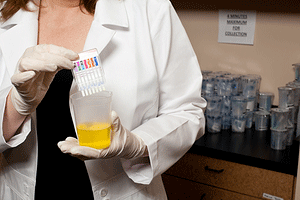What Can Drug Tests Detect & How Long Do Drugs Remain In The Body?
 When searching for “local drug screenings near me” it’s good to know exactly what a drug test can detect. A drug test measures your urine, blood or hair for traces of illegal drugs and prescription medications.
When searching for “local drug screenings near me” it’s good to know exactly what a drug test can detect. A drug test measures your urine, blood or hair for traces of illegal drugs and prescription medications.
The great thing about drug tests is that they are quick, painless and pretty reliable. The most common drugs screened for include amphetamines, benzodiazepines, marijuana, alcohol, PCP, cocaine, and opioids (narcotics).
Why do people require drug tests?
There are countless reasons people require drug testing and it’s nothing to be ashamed about. Employers often require potential employees to take a drug test in order to get hired for the job. For instance, someone with a drug or alcohol problem should not work as a truck driver, air traffic controller or any other occupation that requires complete alertness and accuracy.
Other reasons include:
-If you are in accident you may be asked to take a drug test to prove it was not related to drugs or alcohol.
-Some employers perform random drug tests even on good employees that have been with the company a long time.
-Drug and rehabilitation centers rely on tests to ensure patients are following the program and on the right track to recovery.
-Probation officers typically require random drug testing to ensure you are following in line with the rules set forth by your probation.
-Parents often test teens in order to check for drug or alcohol usage.
-Your primary care doctor may inquire about a drug test if he or she suspects you are abusing drugs or alcohol and it’s negatively impacting your health and overall wellbeing. A drug test is often the first step to identifying a substance abuse problem, after which a doctor can help you take the appropriate steps to get on a treatment plan that works for you.
False Positive Drug Tests: What if you test positive but don’t take drugs or drink?
If you test positive for drugs that you don’t take this is known as a false positive drug test. On the other hand, it’s a false negative drug test if you test negative for drugs that you do in fact take. People are generally more concerned about false positives, in which case you should request a GC/MS test, or a gas chromatography/mas spectrometry (GC/MS). These tests tend to be more expensive and the results take longer to obtain. Although, the benefit is that the results rarely end in a false positive or a false negative. That being said, no test is 100% accurate all of the time because people can find ways to cheat the system and same-day drug usage is not always detectable.
What about poppy seeds—will they really cause a false positive?
The rumors regarding poppy seeds and false positive drug test results are true. Poppy seeds can have opium extract in them, largely depending on where they are harvested and how they are processed. In most cases, over 90% of opium is removed from seeds during processing. Yet, poppy seeds still contain a decent dose of opium and can impact drug tests for up to 48 hours after you eat a cake, bagel or other food that has poppy seeds in it.
BUT, one isn’t generally considered positive for opium unless levels exceed 1.3 [1] microorganisms. In most cases, poppy seeds alone will not cause numbers to increase this much. Still, not all drug tests show different levels, but instead turn different colors to indicate positive or negative results. You might as well play it safe and avoid eating poppy seeds at least 48-hours prior to a drug test.
What are GC-MS drug tests?
GC-MS drug tests are more detailed and provide telling data about specific drug usage. It is not usually the first drug test administered. Instead, it is generally a follow up drug test used if the original test is positive. GC-MS drug tests show exactly what drugs are in your system and in how high of quantities.
How Long Can Drugs Be Detected In The Body?
The lifespan of drugs depends on the actual substance and the drug test administered. The following time frames are based upon urine drug tests; results may vary with blood or hair tests.
Amphetamine can be detected for up to 2 days.
Barbiturates can be detected for 2 days, or as long as 1-3 weeks (depending on half-life).
Benzodiazepines can be detected between 3 days for therapeutic doses or as long as 4-6+ weeks for chronic users.
Cocaine can be detected for up to 4 days.
Codeine can be detected for up to 2 days.
Ethyl alcohol can be detected between 2 and 12 hours.
Heroin can be detected for 2 days.
Marijuana can be detected between 2 and 7 days for single use, but prolonged chronic smokers can test positive for up to 1 to 2 + months after quitting.
Methadone can be detected for up to 2 days.
Methamphetamine can be detected for up to 2 days.
Methaqualone can be detected for up to 14 days.
MDMA can be detected for up to 2 days.
Morphine can be detected for up to 2 days.
Phencyclidine can be detected between 8 and 14 days, or as long as 30 days in chronic users.
Propoxyphene can be detected between 6 hours and 2 days.
Urgent Medical Center provides on the spot drug testing, no questions asked. Visit us today for fast results you can rely on.
